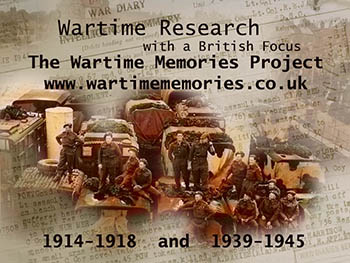|
|
|
HMS Kos
If you can provide any additional information, especially on actions and locations at specific dates, please add it here.
|
Those known to have served with HMS Kos during the Second World War 1939-1945. The names on this list have been submitted by relatives, friends, neighbours and others who wish to remember them, if you have any names to add or any recollections or photos of those listed,
please
Add a Name to this List
Records of HMS Kos from other sources.
|
|
|
The Wartime Memories Project is the original WW1 and WW2 commemoration website.
Announcements
- The Wartime Memories Project has been running for 24 years. If you would like to support us, a donation, no matter how small, would be much appreciated, annually we need to raise enough funds to pay for our web hosting and admin or this site will vanish from the web.
- 27th April 2024 - Please note we currently have a huge backlog of submitted material, our volunteers are working through this as quickly as possible and all names, stories and photos will be added to the site. If you have already submitted a story to the site and your UID reference number is higher than 264001 your information is still in the queue, please do not resubmit, we are working through them as quickly as possible.
- Looking for help with Family History Research?
Please read our Family History FAQ's
- The free to access section of The Wartime Memories Project website is run by volunteers and funded by donations from our visitors. If the information here has been helpful or you have enjoyed reaching the stories please conside making a donation, no matter how small, would be much appreciated, annually we need to raise enough funds to pay for our web hosting or this site will vanish from the web.
If you enjoy this site
please consider making a donation.
Want to find out more about your relative's service? Want to know what life was like during the War? Our
Library contains an ever growing number diary entries, personal letters and other documents, most transcribed into plain text. |
|
We are now on Facebook. Like this page to receive our updates.
If you have a general question please post it on our Facebook page.
Wanted: Digital copies of Group photographs, Scrapbooks, Autograph books, photo albums, newspaper clippings, letters, postcards and ephemera relating to WW2. We would like to obtain digital copies of any documents or photographs relating to WW2 you may have at home. If you have any unwanted
photographs, documents or items from the First or Second World War, please do not destroy them.
The Wartime Memories Project will give them a good home and ensure that they are used for educational purposes. Please get in touch for the postal address, do not sent them to our PO Box as packages are not accepted.
World War 1 One ww1 wwII second 1939 1945 battalion
Did you know? We also have a section on The Great War. and a
Timecapsule to preserve stories from other conflicts for future generations.
|
|
Want to know more about HMS Kos? There are:-1 items tagged HMS Kos available in our Library There are:-1 items tagged HMS Kos available in our Library 
These include information on officers, regimental histories, letters, diary entries, personal accounts and information about actions during the Second World War. |
|
LAC. Leo Bernard Lamb No. 73 Squadron My dad, Leo Lamb served with the RAF during World War II. He signed up in 1940 and went out to North Africa with No. 73 Squadron. On completion of their duties in North Africa, the squadron were then transferred to Italy where the use of Hurricanes was changed to Spitfires. I have traced his movements to Montecorvino (Oct to Dec 1943), to Foggia Main (Dec 1943 to Sept 1944), then onto Canne (Sept 1944 to April 1945). During this spell, detachments were transferred to Hassani in Greece (Sept to Dec 1944), Prkos in Yugoslavia (April to May 1945) plus Brindisi in Italy (May to July 1945).
|
LAC. Cyril Pellowe Cyril Pellowe was my dad.
He was a prisoner of war in Stalag 3b.
He didn't talk a lot about this time, just little things now and then.
He was in the Air Force and was taken prisoner on the island of Kos. He said that all the prisoners gave anything they had to the children before it was taken by the Germans.
When they were in the prison camp they were given injections using a cartridge pen and swapped some of their things from Red Cross parcels with the guards.
|
Thomas Henry "Val" Valentine Thomas Henry Valentine was called up in early 1941, having been waiting on deferred service since late 1940, and joined the RAF as Wireless Operator ACl, No. 1517358.
After initial training he was sent to Egypt and was involved in the push through to Libya. Before long he returned to Egypt whence he was sent to Palestine for further training ready for the assault on the Greek islands as part of an Advanced Landing Ground Party. At the end of September 1943 he was flown to the island of Kos in a Dakota.
Sadly the invasion of Rhodes did not go according to plan and the Allies were unable to establish air supremacy over the area, with the result that the Germans counter attacked on 5th October, 1943. Kos is a very small island and (as my father put it) with "nowhere to run" the allied forces were largely captured within the week. They were held for a short time in the castle on Kos whilst awaiting transport to the mainland of Greece, where they were marched to Athens. Here my father temporarily lost contact with many of his comrades due to sickness and being confined to a series of hospitals.
Next followed a 14 day train journey to the Dulag Luft interrogation centre for RAF personnel, and finally the arrival at Stalag IVB in December 1943. His prisoner number was 263514.
|
Cyril Pellowe My dad was Cyril Pellowe. He was in the Royal Air Force and was taken prisoner on the island of Kos. I think he was then taken by train to Stalag 1Vb.
He was only 22 years old. He told us some tales of his time there. I have his dog tag still but sadly he has now passed away. I have read that it was the Russians who liberated the prisoners from this camp but I am fairly sure that my dad said it was the Americans who liberated them.
|
PO. Albert Thomas Baxter HMS Aurora My father, Albert Thomas Baxter, like many other servicemen never spoke a lot about his wartime experiences. The only important ones being:
Serving as a stoker on the corvette HMS Jason as convoy escort when HMS Curacao was cut in two by RMS Queen Mary in the North Atlantic.
When in the Naafi at Plymouth Dockyard, the Naafi received a direct hit from an enemy bomb. My father was dug out of the debris some time later with his best mate from under a snooker table, where his mate had the presence of mind to drag him. He always said that several servicemen were still sitting around the walls but dead.
His only other experience was whilst on board HMS Aurora they were in action off the island of Kos in the Aegean Sea. Several crew members being killed in this action, but he survived when at his station in the machinery room when an enemy bomb came through the deckhead damaging a propeller shaft and exiting through the ships side without detonating.
He served on HMS Aurora from mid 1942 until she returned to Portsmouth in the summer of 1946, I remember the children's party on board in Portsmouth Dockyard with awnings rigged on the aft deck.
By the way I am still in possession of his 'Crossing the Line' certificate from HMS Aurora complete with the signatures of Captain W G Agnew and the actor Kenneth More
|
Cpl. Thomas Govan MM. 1st Battalion Durham Light Infantry 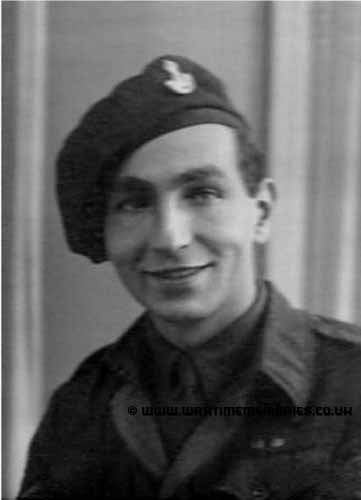 This is an account written by my late father.
Cpl. T. Govan M.M. 4464195, 1st Btn. D.L.I Kos
"I was a Section Leader in the Mortar Platoon which was part of the HQ. Co. and provided support to the other Companies. I travelled from Ramat David Airport by Dakota to Cos with `B`Co. and we flew low over Turkey on the way to avoid detection by German fighters who, it appears, knew we were arriving that way, and were expected to intercept us before we could land.
We were to land at Antimachia Air Strip and had firm instructions that, as the Dakota came to a stop on landing, we were to jump from the open doorway of the plane and disperse as fast as possible to the edge of the air strip, take cover, and prepare to be straffed by German fighters who would try to catch the Dakota on the ground. The Dakota pilot said that from stopping to being back in the air again should take him less than a minute if we did our job properly.
Well we did and as he took off again the ME's came in straffing, All the troops opened fire with rifles and Bren guns on the ME's to try to cover the Dakota's take off, which was successful°
The Companies that had arrived were then put into defensive positions around the airstrip and were used to repair the runway after continuous attacks from the German airforce. This became a losing battle, as there was little dispersal area for any aircraft of ours that could land, and our bivouac positions were under constant attack from the air.
After a few days a new airstrip much closer to Cos town was being prepared and we were ordered to move to a position between the new airstrip and Cos town and were to assist on improving and repairing bomb damage on the airstrip as it occurred.
Early on 3rd Oct. we were 'stood to' and I with my section was moved in support of 'B` & H.Q. Co. which were covering the road from Antimachia to Cos and the new airstrip, following a report that enemy ships had been reported off the island, and there were rumours of German Paratroop landings.
Later in the morning it was obvious that a landing had been made and ships could be seen off the coast. My section took up a position on the forward edge of an olive grove, with a good view of the road and in support of the positions of 'B' and H.Q. Co. and some way forward of Battalion H.Q. The landings were confirmed, and there was very strong enemy activity, and heavy bombing of the airstrips and other selected targets.
All areas came in for some attention from J.U's and Stukas and soon 'B' and H.Q. Companies came under attack from infantry with support weapons, so they requested support from me, which I gave, and discouraged some movement on the road and in front of the forward positions
Soon, the enemy was infiltrating the forward Coys which were very thin on the ground and enemy bombing softened forward resistance. Our positions came under heavy fire from the direction of the road and the mortar was hit by fire that came from the edge of the olive grove.
By then I had lost all radio communication and enemy troops had entered the olive grove from the direction of the road. Shouts from the opposite edge of the grove informed us that all units were falling back and re-forming somewhere in the area occupied by Btn. H.Q.
Withdrawing under cover of stone walls with my section, I found odd stragglers from the forward Coys, who informed me that Btn. H.Q. had withdrawn as well, and the enemy seemed to be in that area, therefore we appeared to be cut off.
I did a Recce to the area that Btn HQ had occupied, and towards Cos town made contact with Q.M (Captain Bush) who gave me directions of the new areas to be defended, and how to reach them. I returned to my section and led them and the stragglers towards Cos town where we rejoined what remained of the Btn. There, I was placed under the command of Capt. Armitage and put into positions on the forward edge of Cos town, covering the road with rifles and Brens.
We held the Germans there until dark, later, after we had had our first meal of the day, it was decided that the Btn would withdraw back into the town and leave it by the south end. We were to move in small groups and make our way into the hills, where we would rejoin with the rest of the Btn.
I was to remain behind with a small group under Capt. Armitage to cover this withdrawal, we were to leave some hours later without the enemy knowing where we had withdrawn to. This was to be done before daylight. This we did and just got clear of Cos town before daylight, and headed into the hills, but enemy spotter planes were soon in the air and movement was quite difficult.
We 'holed up' when we found suitable cover and moved when possible, but on 5th Oct. we were eventually spotted from the air, surrounded by ground troops in a position impossible to defend. The German commander called on us to surrender before he called in the Stuka's to move us from our position We were instructed by our officer to lay down our arms after first trying to make them unusable, this we did, and when we came to our 'hiding place' found that our captors had completely surrounded us and had planes flying in support overhead.
We were taken to Cos town, and while being escorted from the hills managed to straggle which made escorting difficult, and enabled some escapes to be effected by some of the group. Some of these were soon spotted, but I believe one or two were successful°
In Cos town we were taken to a compound where we joined a number of officers and men who were already being held under guard
After being there a few days we were taken by boat to Athens. Then after another few days we were loaded into cattle trucks and spent the next couple of weeks moving around the Balkans, As the Germans struggled to move us to Germany they found that the lines were being sabotaged by various 'Freedom Groups' in Greece and Yugoslavia.
We eventually arrived at a P.O.W. camp outside Munich, where everyone was registered and I, as an N.C.O., refused to work for the Germans and was sent to an appropriate P.O.W. camp.
That wasn't the end of my father's story he was given the PoW number 50095 and at the wars end was listed amongst those at a Camp (Stalag 357) near Fallingbostel. Like many, he settled back into civilian life after the war raising a family and talking little of his Wartime escapades.
He was not presented with his Military Medal, it was sent to him and the circumstances of the award were all but a mystery to us, his family. Then fate took a hand in proceedings - sadly during a Burglary at home his Military Medal amongst many other things was stolen.
Some years later a letter was received at my father`s childhood Altrincham address, from a male who claimed to be a Police Officer in Derbyshire and claimed to have possession of his Military Medal, which he had purchased at a military auction. As luck would have it my father's brother still lived at the Altrincham address and forwarded the letter to my father, who then lived in Derby. As further luck would have it I was then a police officer in Derbyshire and was able to confirm that the sender of the letter was indeed a Police Officer, Detective Chief Superintendent Duncan Bailey.
Contact was made between my family and DCS Bailey and the outcome was that DCS Bailey invited my father and I to the Derby Police Social Club so he could return the medal to him, all he asked in return was a chat with him about his experiences during the war and the action resulting in his medal award.
It was a great surprise when we met Duncan Bailey for he presented my father with an A4 folder with a D.L.I. cap badge on the front and not only the mounted Military Medal inside, but a photograph of my father in uniform (the family at that point had none) and, all the mounted campaign medals he had earned in the war. This folder also contained letters from The King, his Commanding Officer and the War Office. Included was the above account written by my father of the action resulting in the award of his medal during action on Kos.
My father was also granted `The Malta Medal` for his service with the Durhams on the George Cross Island.
|
Pte. Ernest Edward Cochrane MID. No.18 Company Royal Army Medical Corps Ernie was born in East Ham in the East End of London on 18th April 1917. At the outbreak of war in 1939 he was a conscientious objector. Nonetheless, on June 6th 1940 he was deemed to have enlisted in the Territorial Army Non-Combatant Corp and posted to A.M.P Corps. No.2 Centre, Caister. During the 1930s Ernie had gained a St John's Ambulance first aid qualification so he was discharged from the T.A. to join the Royal Army Medical Corps. Aged 23, he took the oath of Allegiance at Girton College Cambridge and was posted to R.A.M.C. No.18 Company. He was graded and mustered and posted to No.1 Depot and Training Establishment R.A.M.C. Crookham (Crookham Camp, Aldershot) with the rank of Private and service trade, Nursing Officer Class II. The date was September 4th 1940.
Ernie said the R.A.M.C. was otherwise known as "Run Away Matron's Coming". After receiving training, his company embarked on a convoy ship departing from Glasgow on Dec 12th 1940 for Malta. No sooner had the ship left the Clyde than its engine started producing plumes of black smoke. Being unable to keep up the convoy it was left behind and forced to continue alone, pouring smoke, a sitting duck to any U-boat. Luckily, they did make it to Gibraltar. After repairs there, the ship set sail for Malta but was forced to divert to Pireas in Greece first because of German bombing. Malta was under siege by the Germans 1940-1942.
Eventually, on January 14th 1941, Ernie disembarked in Malta and remained there throughout the siege. Two days later on 16th January HMS Illustrious was bombed in Grand Harbour. Life on Malta was not easy. Ernie thought the troops probably faired better than the locals as at least they had some army rations. When he arrived, he said, there were lots of cats and dogs on the island but by the time he left there were only their fleas. His cousin Doreen, a young evacuee back in England, was chastised by Ernie after she wrote to him about all the nice things she’d had to eat at Christmas. At one time on Malta, Ernie was in a cinema which was bombed. He was eventually dug out of the rubble without, he claimed, a scratch on him. Whether this event accounts for his stay in the General Hospital Imtarfa between May 5th and June 13th 1941, we do not know.
On Sept 4th 1941 Ernie was advanced to Nursing Officer Group 'C' Class I, although it wasn’t until March 1943, after the siege of Malta had effectively ended, that he undertook the required course of instruction at 45 Gen Hasp. Recognition of his status as Nursing Officer Class I was not noted in his service record until April 14th 1943.
On Aug 26th 1943 Ernie left Malta. He was taken by ship to N. Africa for a new posting with the Mediterranean Expeditionary Force. En route many suffered from stomach upsets which were officially put down to seasickness but Ernie put down to bad bully beef. They landed in N. Africa (Alexandria, Egypt) and from here they were taken to Haifa by railway.
Ernie’s service record states that on Sep 20th 1943 he was “Moved for unknown destination” and three days later “Disembarked in Cos”. Cos had been held by the Italians until September 1943 when an unconditional armistice with the Allies was announced. Ernie and a couple of fellow medics were sent to Cos to assist the British fighting troops there at an inland medical unit.
On Oct 3rd 1943 at 4.30am Germans invaded Cos with Ju 87 dive bombers, Brandenburg Division paratroopers and sea-bourne troops. From the medical unit they could see the German's parachuting into the hills in and around Antimachia. They could hear the bombing and shooting but their commander said there was nothing to do but wait. The following morning the Germans arrived at the medical station and commanded the allied troops to collect their belongings and line up outside. Not wishing to be a POW Ernie escaped via his hut's back window and headed for the sea. When an uproar ensued behind he dived into an irrigation ditch to hide and await darkness before moving off. After the war Ernie learnt that his mate, nicknamed Tiny, was taken prisoner that day and spent the rest of the war in a German stalag.
That night Ernie hid under a bridge to sleep. Early morning the next day he was alarmed to find there was a German Officer shaving outside a nearby hut. Ernie was forced to wait until the coast was clear before emerging. He made his way to the sea and searched in vain along the coast for a boat. Whilst sitting in the sand dunes eating his emergency rations he heard a German soldier shout "Achtung". He hurriedly slithered into sea on his belly. In panic he swam under water for as long as possible to avoid detection thus beginning a ten miles swim to the Turkish mainland. At this time Turkey remained neutral in the war. Ernie had been a champion swimmer in his East Ham swimming club so was not daunted. His swim was guided by the lights of a fishing port on the Turkish coast. He found an oil drum in the sea to aid his buoyancy. He was picked up near the Turkish coast by a Turkish fishing boat. At the local port he found many other escapees who had arrived by boat but no-one else who had swum. When my father told me this story in the 1990s his narrative was in the singular. However, one of my brothers says Ernie was not alone on his escape endeavor but our father had told him that none of his other compatriots actually survived the swim. Ernie was unsure what had happened to them.
From Turkey the escapees traveled in a landing craft to Castel-Rosso (now called Kastelorizo), a Greek island further east, 2 miles off the Turkish coast and still held by the British. From here Ernie was evacuated to Beirut. The 18th Company R.A.M.C. were still based in Haifa, Palestine. However, in Beirut Ernie is not immediately sent to re-join his unit in Haifa but held in solitary confinement and asked to write what has happened and how he got here. He doesn't find out, until arriving back in Palestine on 14th October, that his comrades have been asked to read his account and verify he is who he claims to be. He thinks the military may have thought him a potential spy.
Two weeks later, on Oct 31st 1943, Ernie is moved once again from “Palestine to unknown destination”. On Nov 3rd 1943 he disembarked on Leros. He is here nearly 2 weeks before the Germans come. During this time an officer insist they paint a big red cross on the roof of their forward medical station so it wouldn't be bombed. Vain hope! On Nov 12th 1943 at 4.30am the Germans landed on Leros and heavy fighting ensued. Ernie was Mentioned in Dispatches for distinguished service. This was published in the London Gazette 23rd March 1944. He thinks this may have been for single handedly rescuing a badly injured soldier when their forward medical station was bombed. His senior officer had gone in search of transport and never returned.
In the morning of the 16th the British surrendered. Back in the UK Ernie was reported “Missing (Aegean)” and “Posted to X(VI) DCL 748/43”. However, Ernie along with the injured allied troops were loaded aboard a hospital ship as POWs and set sail for Northern Italy - ultimate destination a stalag. The details of what happened next are unclear. There are two, not necessarily conflicting versions. En route they came across a British held ship full of injured German prisoners of war. The two commanders agreed to swap prisoners. Alternatively, en route they encountered the Royal Navy which forced the hospital ship into Brindisi. Either way Ernie landed in Allied held Brindisi, Southern Italy on December 12th 1943. Back home his record entry states “Previously reported missing now located having been recaptured. Removed from X(VI) DCL 755/43”. On December 18th he is “posted to X(IV)C”. On 24th December he joins the British North Africa Force and posted to X(i) which was a list of escaped POWs awaiting repatriation to the UK. From Brindisi in Italy he sailed to N.Africa and his photographs show a transport train in the Atlas mountains between Tunis and Algiers in Dec 1943 and a large group of British soldiers in uniform at Fort de l'Eau Algeria (a suburb of Algiers) in Jan 1944.
Ernie lands back in England at the port of Liverpool and by the end of January he is back in London. His service record on the 8th February declares that he is “Disembarked UK from overseas”; “Posted to 'Y' List Class 'D' (Escaped POWs)” and given some leave.
On March 23rd 1944 Ernie learned he has be awarded the Emblem for being Mentioned in Dispatches in recognition of gallant & distinguished services in the field.
On 7th April 1944 he was required back at work with the R.A.M.C. 18th Company stationed in Millbank Barracks, London SW1. Ernie was set to work in the Queen Alexandra Military Hospital (QEMH) Millbank. These buildings later became Chelsea College of Art & Design and part of Tate Britain next door. Ernie claimed that the only thing of note he did from then to the end of war was to give King Hussein of Jordan TTC injections. It could have been different as, at some stage, there was the toss of a coin to decide which of two Medical Officers is to serve in the D Day landings (June 6th 1944). Ernie stayed in London!
In Ernie’s medical report in April 1946, prior to his release, the countries in which he served are listed as: Malta 2yrs 9 months; Dodecanese & Palestine (together) 4 months; Italy and Algeria (together) 2 months; U.K. 2 years. Ernie proceeded on terminal leave on May 9th 1946 and went on to a highly successful career in Local Government Public Cleansing.
After a whirlwind romance Ernie proposed to Wren Olive Winifred Bailes. They met at a YWCA dance in London and married at St George & St Ethelbert Parish Church East Ham, London E6 on July 26th 1944. There were no photographs of this wartime wedding as there was no photographic paper available at the time. They were married for over 50 years and had 4 children.
It was not until he was in his eighties and nineties that my father talked about his wartime service and then only very seldom, when pressed. We do know he suffered from bad nightmares associated with his wartime experiences and particularly his cinema bombing experience on Malta and his underwater escape from Cos. His sister, my Auntie Edie, said that during the war people were continually warned that “Talk Costs Lives” so became used to not to talking about their work and after the war everyone just wanted to forget and get on with their lives. The story here is derived from the bits my father told us, memories from his sister and cousin, and his wartime photographs, all pieced together with the aid of his wartime service record and the internet. We acquired his service record from the Historical Disclosures Section of the Army Personnel Centre in Glasgow, after my father’s death in January 2010 aged 92.
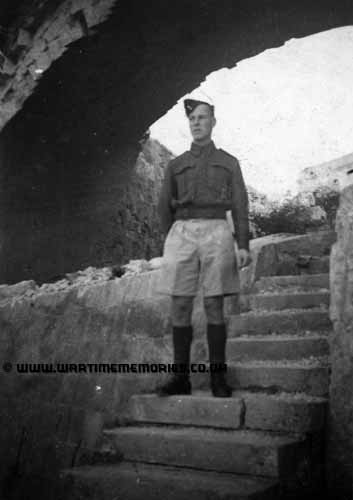
Ernest Cochrane, Floriana, Malta 1942
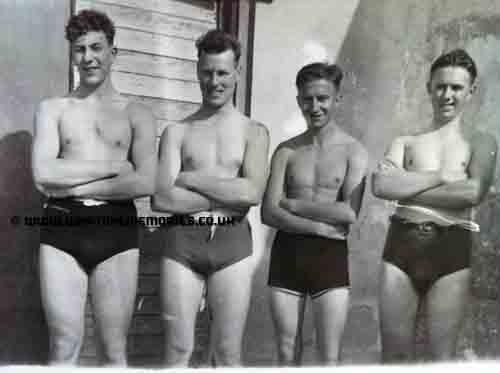
Malta 1941 From left to right: ?? : Ernest Cochrane : G. Goodie : Owen Green
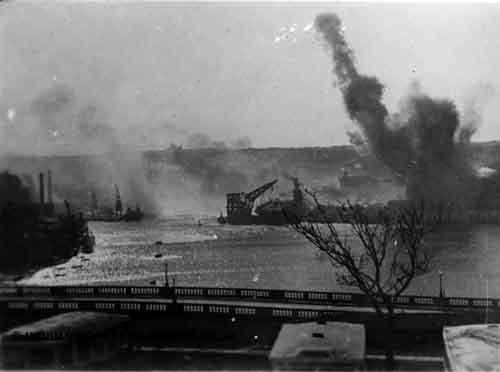
The bombing of HMS Illustrious, Grand Harbour, Malta January 16th 1941
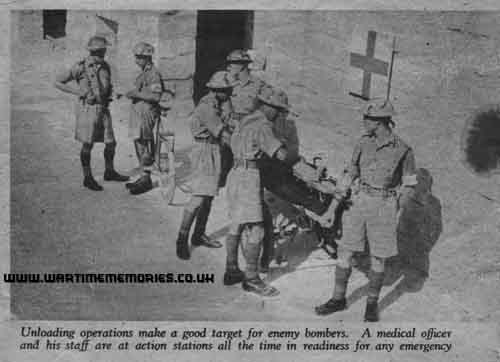
Ernest Cochrane on the right. From Illustrated August 29th 1942
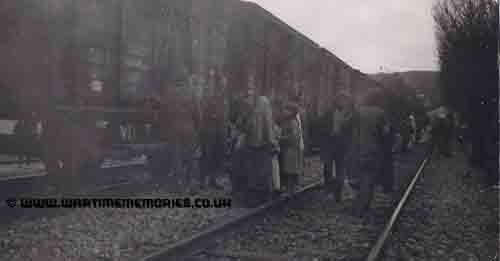
Transportation train in the Atlas Mountains between Tunis & Algiers December 1943
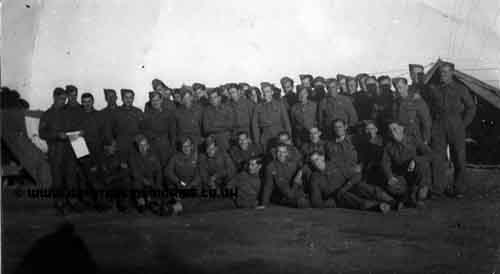
Fort de l'Eau Algeria January 1944
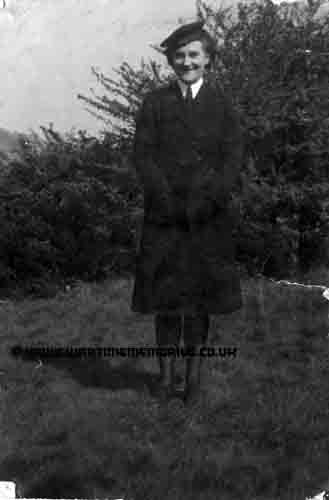
Olive Winifred Bailes (W.R.N.S. No 46361)
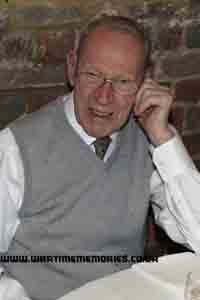
Ernest Cochrane aged 92 (Dec.2009)
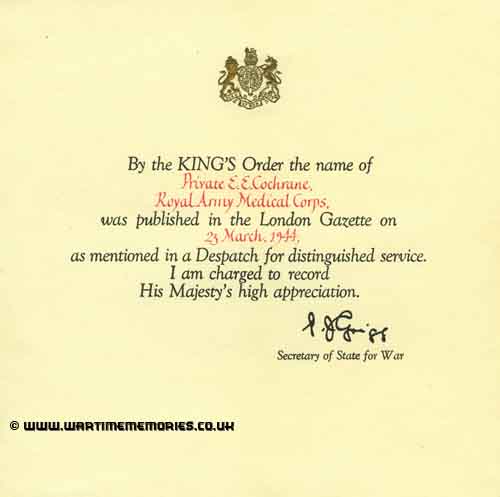
Citation Certificate
|
Recomended Reading.Available at discounted prices.
|
|
|


